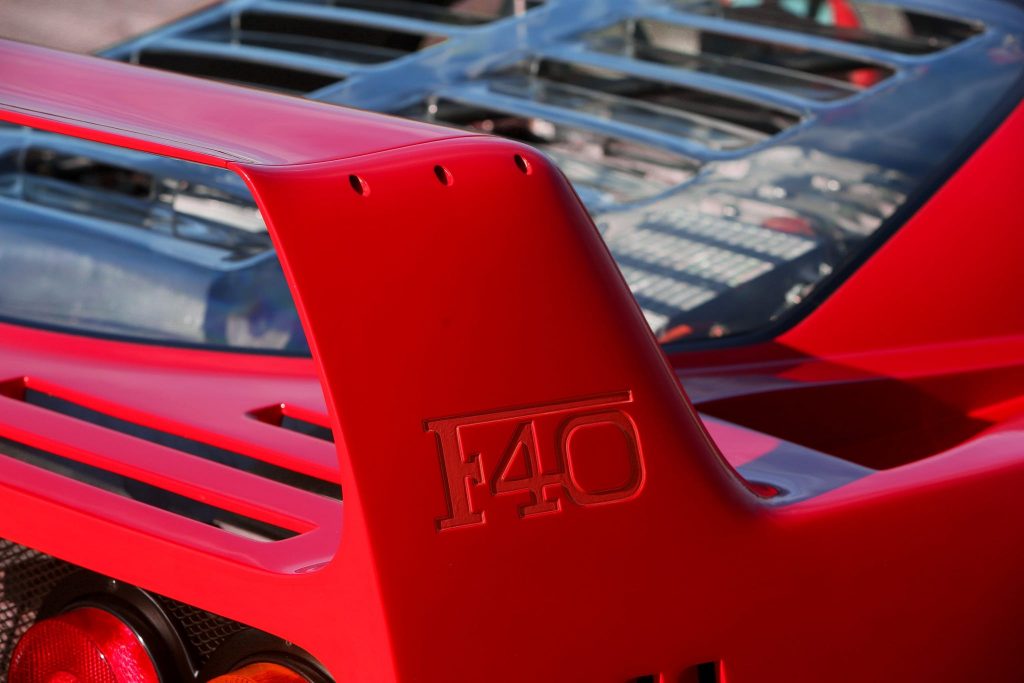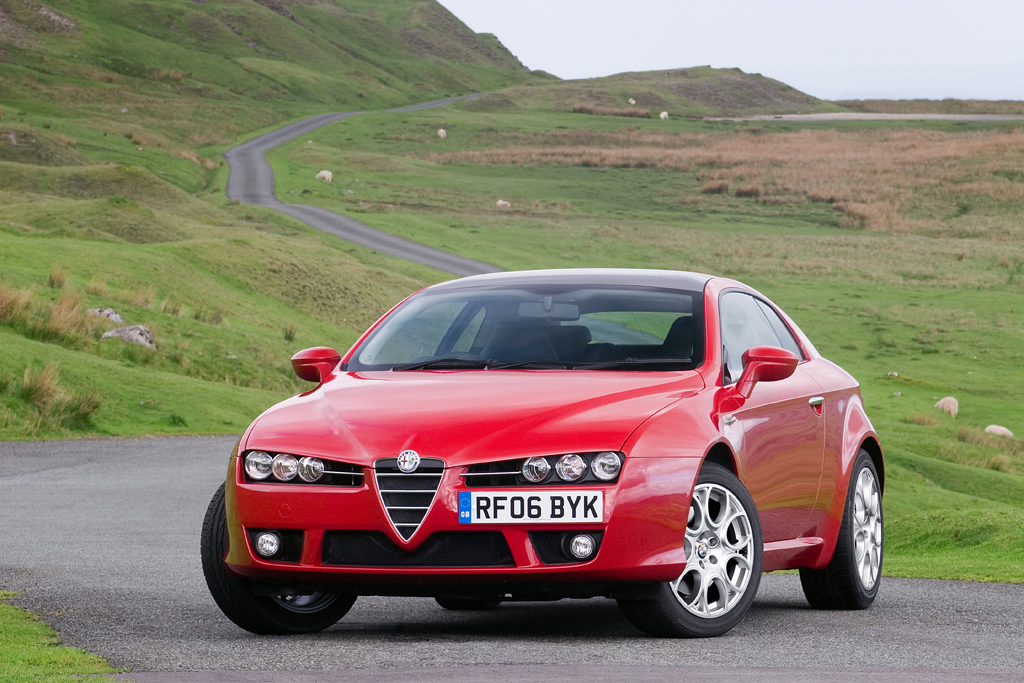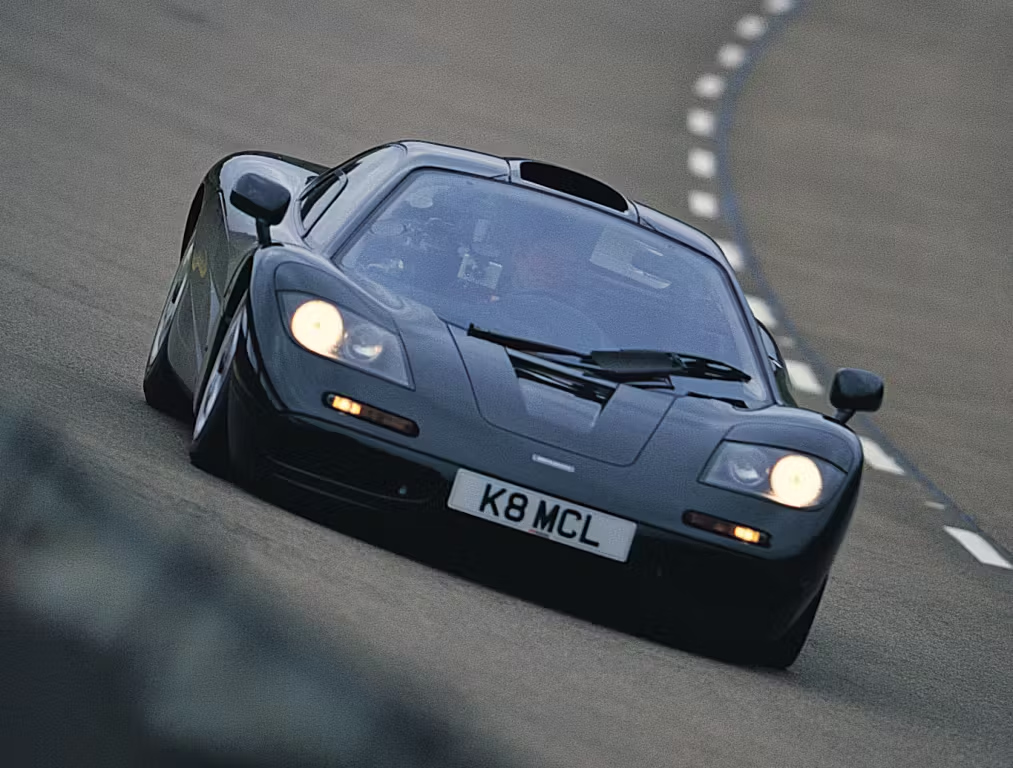The Ferrari F40 has had a stratospheric year. New world records for the model have been set, median auction sales prices have risen by over 50 per cent in the past 12 months, and every single example offered at public auction sold. The lowest brought $1.22M—a strong price just a few years ago.
But the question is, why now? Why has this, possibly one of the most instantly recognisable Ferrari creations, suddenly gripped the imagination of the public (and those with the money to buy one) in such a big way?

Right from its launch, the F40 was impressive. The Pininfarina-designed body is stunning to view at every angle, from the snarling, drooping snout to the wonderful louvres of the polycarbonate engine cover. Underneath, it truly lives up to the description that’s a cliché for so many other cars: it is a racing car for the road. Or, better yet, what people imagine and hope a racing car for the road might be. 478 lovely horsepower is forced from the 2.9-litre V8 thanks to two howling turbochargers, making it the first production Ferrari to top 200 mph. Then, there’s the iconic seats, the minimalist steering wheel, the exposed carbon and Kevlar, and the gear selector gate. The rear wing wouldn’t look out of place on a transatlantic airliner. With no clever driver aids to speak of, it demands to be driven properly, making it a car of automotive legend.
But all of this hasn’t changed in the last year. The car was great in 2020, and it remains great now. So why are more people spending big money to get one? Demographics may be one answer. As we’ve noted recently, Generation X – people born between 1965 and 1981 – are hitting their peak earning years and are driving huge increases in their favourite vehicles.
In 2018, just 29 per cent of F40 owners insured worldwide by Hagerty were Generation X or younger. This year, that figure is 54 per cent. On average, these young F40 owners have 18 cars. That’s serious collector behaviour and shows money is probably not in short supply. So, over half of Hagerty’s F40 owners are people who were kids or young adults when the car burst onto the scene. Now, some of them have made their millions, and they are out to buy.
"The F40 has always been a very iconic car, and there has been a surge in requests for the car in recent times," said Max Girardo, director of the high-end dealer Girardo & Co. "There is something to say about the generation of people that remember them as kids that now have the opportunity to buy one – hence driving up demand."
The shrinking age of the group of owners may also explain why the F40’s rise in prominence was so fast: these are the key demographic for social media users, and they’re seeing the car everywhere both online and in print. This year, we’ve seen a yellow F40 power sliding on a dirt track, a grey one driving through London, and Car Chat podcast host Sam Moores’ blue F40 sell online. On YouTube, Doug DeMuro compared an F40 to a Porsche Carrera GT, Mr JWW drove one, and Yiannimize wrapped another; this sort of attention usually goes to newly launched vehicles that have concerted PR campaigns behind them, not a 30-year-old car that few will ever get to experience in person.

It is also true that when Hagerty sees a number of seminal high sales of a model, others tend to follow. This year, the blue F40 mentioned above was the first to draw headlines, especially in the United Kingdom, as it marked the first time a car had sold for over £1 million in a dedicated online auction. That was a huge moment: the point at which bidders felt able to trust an online description enough to click seven digits into a ‘bid now’ box.
Next came Monterey in August. Here, Gooding & Company sold a 2500-mile example for $2,892,500 (£2.08m) followed by a 1991 model that sold at RM Sotheby’s the following day for $2,425,000 (£1.74m) – a car that RM previously sold at the 2017 Monterey auction for $1,540,000. Even a Hagerty condition #3 ("Good") example with 16,000 miles on the clock was sold for $1.6M by Bonhams, As Colin Comer wrote at the time for Hagerty, these sales reset the market for the F40.
Auction sales can indeed drive the market upwards, but they are not everything. Many examples of cars this expensive and rare never reach the public market but are traded behind closed doors. Interestingly, when I spoke to the dealers in this sector, they had a slightly different view of how stratospheric the F40's rise is.
"They [the Monterey F40s sold by Gooding and RM] were two outstanding cars, so high tide results… the price rise is steady in my opinion, not phenomenal," said James Cottingham of marque experts DK Engineering. Girardo agrees. "As a model we have seen the values steadily increase over time."
Whether it was a high tide moment or not remains to be seen. Personally, I believe that values will continue to increase, especially for those cars that are at the lower end of the condition spectrum: while UK Hagerty Price Guide values for the F40 rose by 30.4 per cent over the year to December 2020, prices of Condition #4 ("Fair") vehicles increased by just 13.2 per cent. Buyers want the good ones, and in a bull market such as this, the price gap encourages owners of rougher examples to push money into high-quality restorations.
It seems Girardo agrees: "The F40 is and always will be an iconic car – exciting to drive, great looking, and the right badge on the front so you will never go wrong." If I had the money, I’d love to find out how right he is.
John Mayhead is the editor of the UK Hagerty Price Guide.
Read more
‘The most exciting supercar in the world versus the greatest.’ Head-to-head in the Ferrari F40 and Porsche 959
9 Ferrari-branded collectables for the tifosi
Can you really trust online auctions?








